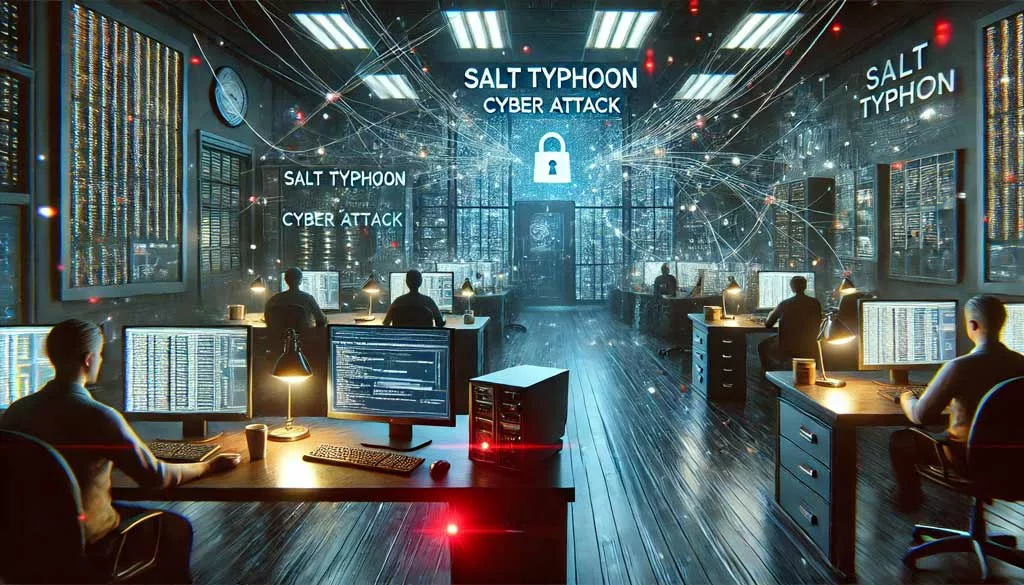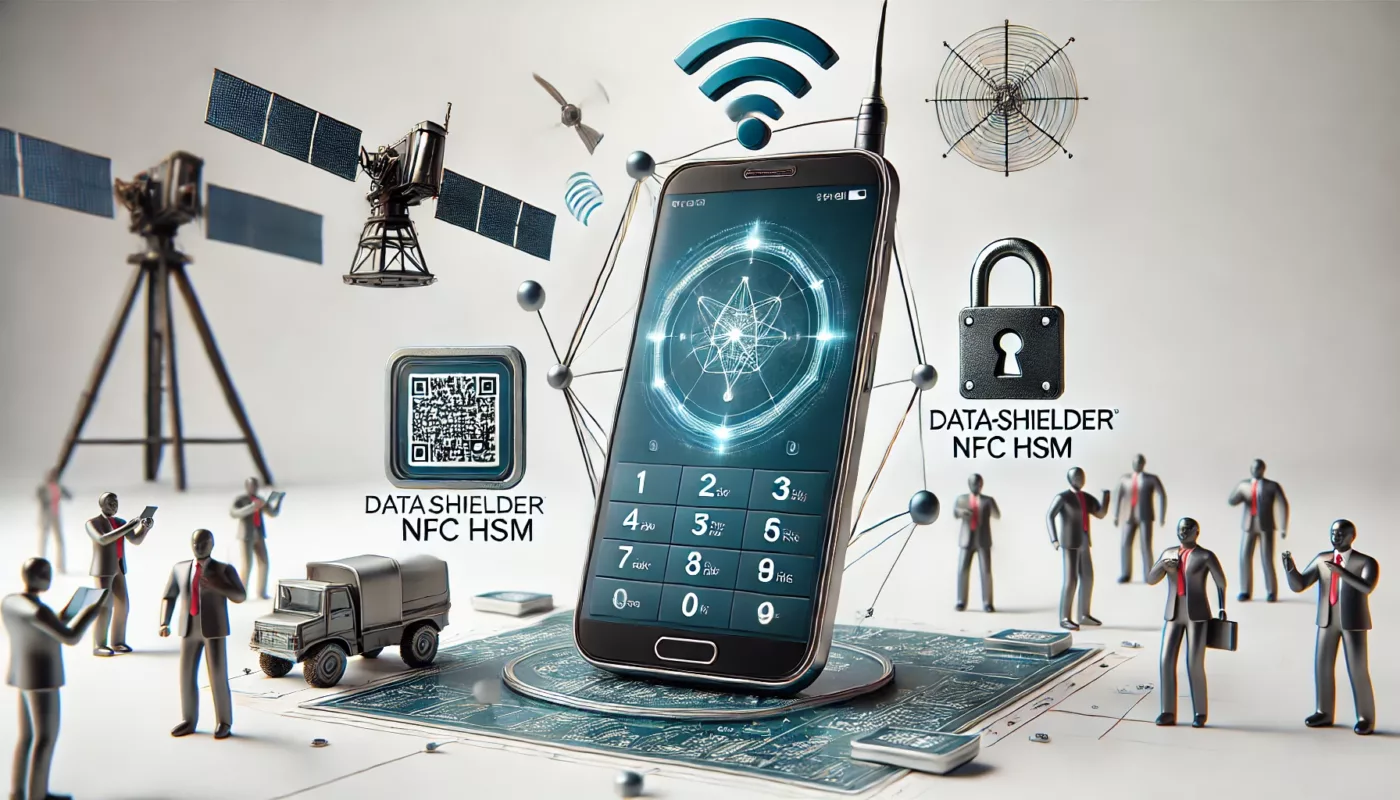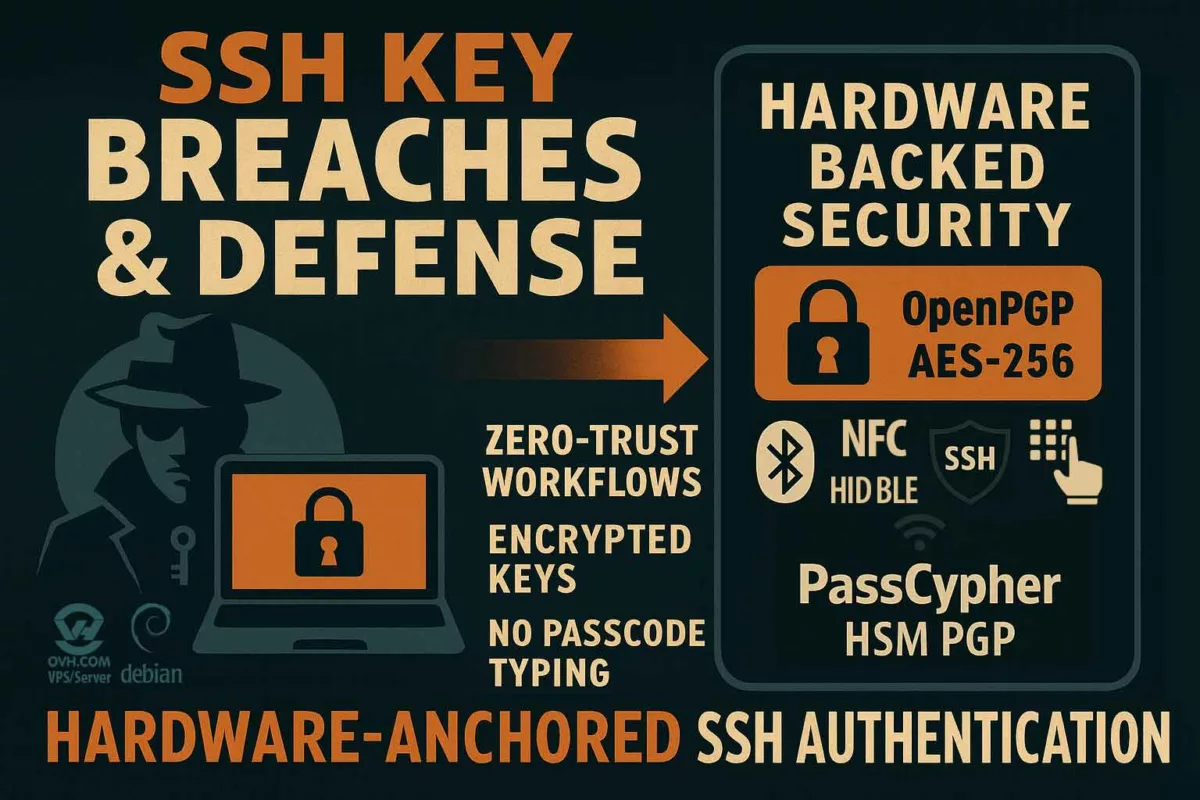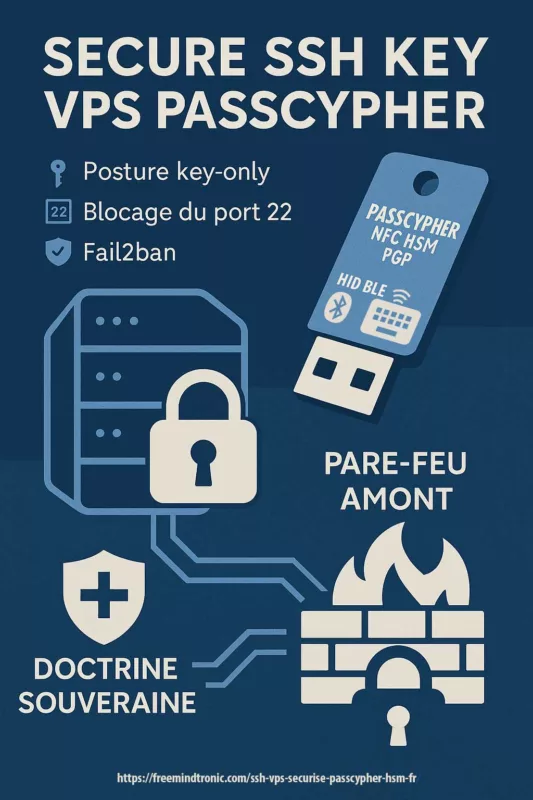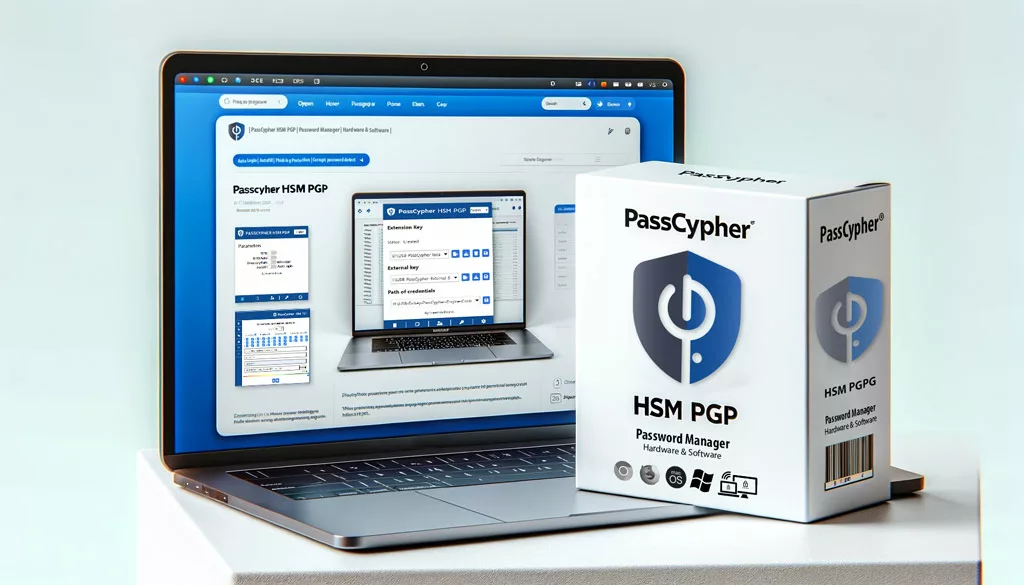Salt Typhoon and Flax Typhoon: Security Solutions for Government Agencies Against Cyber Espionage
Salt Typhoon and Flax Typhoon are two related state-sponsored cyber espionage campaigns that pose significant threats to government agencies worldwide. These campaigns, targeting critical infrastructure, highlight the need for effective solutions to protect government communications from cyber espionage. Solutions like DataShielder NFC HSM offer secure encryption to safeguard mobile communications from state-sponsored cyber threats.
Salt Typhoon – The Cyber Threat Targeting Government Agencies
Salt Typhoon and Flax Typhoon represent two related state-sponsored cyber espionage campaigns that have significantly impacted government agencies. These sophisticated attacks utilize advanced phishing, spyware, and zero-day vulnerabilities to infiltrate government systems and steal sensitive data. The growing sophistication of these campaigns highlights the critical need for secure communication solutions like DataShielder NFC HSM.
But what exactly does Salt Typhoon entail, and how did it come to light?
What is Salt Typhoon? A Rising Cybersecurity Threat
This operation poses a serious cyber threat, with advanced espionage tactics aimed directly at government institutions. This operation, linked to state-sponsored actors, has raised significant concerns within U.S. agencies. Recently, officials warned employees to limit mobile phone use due to potential cyber vulnerabilities associated with this attack. For more on this advisory, you can refer to the original Wall Street Journal report, which outlines the severity and implications of Salt Typhoon.
Expanded Scope of Salt Typhoon Attacks
Recent updates confirm that Salt Typhoon has expanded its reach to nine major U.S. telecommunications companies. These include Verizon, AT&T, T-Mobile, and Spectrum. This expansion emphasizes the growing complexity of cyber threats against government communications. It further underscores the need to implement advanced encryption methods to prevent cyber espionage in government communications. This includes private conversations involving political figures, such as staff from the Kamala Harris 2024 presidential campaign and individuals linked to Donald Trump and JD Vance. The targeted information is invaluable. It exposes vulnerabilities at the highest levels of government and politics.
The Federal Communications Commission (FCC) has addressed the expanded scope of these attacks in its official FACT SHEET on the implications of the Salt Typhoon attack and FCC response (FCC Fact Sheet).
Growing Threats to Government Cybersecurity
To understand the scope of Salt Typhoon, it’s crucial to examine what makes it a significant cybersecurity risk. Salt Typhoon represents an organized campaign specifically engineered to penetrate mobile and computer systems within government networks. This threat has been carefully crafted to bypass standard security measures, allowing it to access highly sensitive information. With state-sponsored cyber threats like Salt Typhoon and Flax Typhoon increasing in sophistication, security solutions for government agencies against Salt Typhoon are more critical than ever.
Impact on National Security
The consequences of Salt Typhoon and Flax Typhoon are far-reaching and impact national security at multiple levels. Both cyber espionage campaigns exploit vulnerabilities in government networks, causing substantial damage to critical operations and sensitive data. If sensitive data—such as classified government communications—were exposed, the effects would be devastating. These attacks highlight the urgent need for solutions to protect mobile communications from cyber attacks espionage, especially in critical sectors like telecommunications and government. Furthermore, these operations have demonstrated how attackers can infiltrate secure channels, gaining strategic insights and potentially sabotaging critical diplomatic or security operations.
The Congressional Research Service (CRS) released a report detailing the Salt Typhoon hacks of telecommunications companies and federal response implications, reinforcing the need for stronger protective measures within government networks (CRS Report).
Consequently, the threat posed by Salt Typhoon and Flax Typhoon is immense, as both campaigns target critical infrastructure and government communications. These attacks highlight the need for secure communication methods, especially for mobile communication. Implementing encryption for SMS can prevent interception and protect sensitive data. For more on this, explore our related article on The Critical Need for SMS Encryption here.
Discovery and Origins of Salt Typhoon
Salt Typhoon was uncovered when analysts noticed an unusual surge in phishing attacks targeting high-ranking officials. These attacks targeted high-ranking officials within government agencies, raising red flags across the cybersecurity community. Working together, researchers from top cybersecurity firms and intelligence agencies traced these attacks back to a group suspected to have links with Chinese state operations. The subsequent analysis revealed that Salt Typhoon used a complex mix of tactics—such as zero-day exploits and spyware—to infiltrate systems without detection. But how exactly does Salt Typhoon operate, and what methods does it employ?
Flax Typhoon: A Parallel Threat to Salt Typhoon
In addition to the ongoing Salt Typhoon campaign, Flax Typhoon, a parallel cyber espionage operation, has emerged, targeting U.S. government agencies. Similar to Salt Typhoon, Flax Typhoon also employs advanced phishing techniques, spyware, and zero-day vulnerabilities. While Salt Typhoon targets government agencies directly, Flax Typhoon has extended its reach into telecom networks, adding another layer of complexity to the attack. Moreover, Flax Typhoon extends its reach into telecom companies, amplifying its potential for widespread disruption. According to the U.S. Department of the Treasury, Flax Typhoon is linked to state-sponsored hacking groups and presents a growing threat to national security. Learn more about Flax Typhoon from the official Treasury release here.
How This Threat Operates
Just as Salt Typhoon uses advanced phishing techniques and zero-day exploits, Flax Typhoon has been noted for its exploitation of telecom network vulnerabilities, which significantly increases its scope and potential damage. Here are some of the core techniques behind this attack:
- Advanced Phishing and Smishing: By sending deceptive links through email and SMS, attackers use realistic, spyware-laden messages to deceive officials into clicking harmful links.
- Spyware and Malware Injection: After gaining access, the attack covertly monitors calls, messages, and even device locations, using sophisticated spyware. It even hijacks cameras and microphones to provide real-time surveillance.
- Exploitation of Zero-Day Vulnerabilities: Salt Typhoon leverages unknown system vulnerabilities to access networks secretly, making it nearly impossible for traditional security protocols to detect.
- IMSI Catchers and Network Interception: Using IMSI catchers, Salt Typhoon intercepts mobile communications, allowing attackers to eavesdrop and capture critical data.
Both Salt Typhoon and Flax Typhoon use techniques such as IMSI catchers to intercept mobile communications. These sophisticated attacks emphasize the importance of implementing strong encryption for sensitive data to prevent unauthorized interception by cyber adversaries. To better understand why SMS encryption is critical, read our comprehensive guide on The Critical Need for SMS Encryption here.
Each of these methods showcases the advanced nature of Salt Typhoon, but why are government agencies the primary targets?
Why Government Agencies Are Prime Targets
To counter these growing threats, it’s essential for government agencies to adopt advanced encryption methods for preventing cyber espionage in government communications. The focus on government agencies underscores the sensitive and strategic nature of the data they hold. Attackers aim to capture:
- Confidential Credentials: Stolen login information provides attackers with access to restricted databases and sensitive operational details.
- Real-Time Location Data: Tracking officials’ movements gives attackers critical insights into strategic activities and plans.
- Sensitive Communication Channels: Communications between government officials often contain details on operations and intelligence, making unauthorized access a serious national security risk.
Given the sensitivity of this information, the repercussions of Salt Typhoon on national security are severe. But what could these repercussions look like in practice?
National Security Implications of Salt Typhoon
This cyber campaign doesn’t merely threaten privacy; it impacts national security at multiple levels. Here’s a look at the potential consequences:
Potential Repercussions of a Security Breach
- Exposure of Classified Information: A breach within a government agency could lead to sensitive data leaks, risking public safety and affecting diplomatic relations.
- Interruption of Critical Operations: If attackers gain control over secure communication channels, they could disrupt essential operations, impacting intelligence and diplomacy.
- Loss of Public Confidence: Breaches like Salt Typhoon can erode public trust in the government’s ability to protect information, creating long-term reputational damage.
U.S. Government Response and Sanctions
In response to Salt Typhoon, the U.S. government has sanctioned Integrity Technology Group, a Beijing-based cybersecurity firm allegedly supporting Flax Typhoon and other state-sponsored cyber operations. These sanctions aim to prevent further infiltration into U.S. systems and disrupt the cyber espionage activities linked to Flax Typhoon and Salt Typhoon. These sanctions target entities directly supporting state-sponsored cyber groups engaged in Salt Typhoon and similar attacks. The sanctions aim to disrupt operations and prevent further infiltration into U.S. systems.
However, sanctions alone are insufficient. Government agencies must prioritize securing mobile communications with encryption to better mitigate the risks posed by these state-sponsored cyber attacks. The U.S. Department of the Treasury issued an official statement regarding the sanctions against Integrity Technology Group, emphasizing its role in supporting malicious cyber activities linked to Salt Typhoon (Treasury Sanctions Press Release).
Recognizing these threats, government agencies must adopt robust defense strategies to safeguard against Salt Typhoon. But what solutions are most effective?
Recommended Defense Strategies Against Salt Typhoon
Countering Salt Typhoon demands advanced cybersecurity measures designed to protect against sophisticated threats. This includes implementing solutions for secure communication for government agencies such as DataShielder NFC HSM to combat advanced phishing attacks, spyware, and unauthorized data access. Below are some key strategies for enhancing security within government agencies.
DataShielder NFC HSM – A Key Solution for Secure Communications
One of the most effective solutions is DataShielder NFC HSM, which provides robust encryption for SMS, MMS, RCS, emails, and chat without the need for servers or databases. By utilizing DataShielder NFC HSM Master for advanced encryption or DataShielder NFC HSM Lite for essential encryption, agencies can ensure their data remains secure and anonymous at the source.
For organizations focusing on secure authentication to prevent identity theft, DataShielder NFC HSM Auth offers a reliable solution against AI-assisted identity fraud in workplace settings. Additionally, DataShielder NFC HSM M-Auth is ideal for protecting identity in mobile environments, even when users are on unsecured networks.
For desktop or laptop applications, DataShielder PGP HSM enhances security with strong encryption and secure data transmission when paired with a DataShielder NFC HSM device.
While defensive measures are essential, the global implications of Salt Typhoon also require international collaboration and diplomacy.
Additional Security Measures for Government Agencies
In addition to solutions like DataShielder, agencies can implement further protective practices:
- Limiting Public Wireless Connections: The NSA recommends disabling Wi-Fi, Bluetooth, and GPS services when they are not necessary, to reduce interception risks.
- Regular Security Updates: With Salt Typhoon exploiting zero-day vulnerabilities, frequent updates help close known gaps and protect against attacks.
- Implementing VPNs and Multi-Factor Authentication: Additional layers of security protect devices connected to government networks.
- Cybersecurity Training Programs: Training employees to recognize phishing and smishing attacks reduces the likelihood of human error leading to a breach.
How to Safeguard Against Salt Typhoon
Given the evolving nature of Salt Typhoon, government agencies must adopt more advanced cybersecurity measures to prevent further breaches. Solutions like DataShielder NFC HSM offer essential protection by providing robust encryption for communications, without relying on servers, databases, or user identification. This ensures that government communications remain secure and anonymous.
The National Institute of Standards and Technology (NIST) has provided updated guidelines on securing mobile and network communications, emphasizing the importance of encryption in mitigating risks posed by threats like Salt Typhoon (NIST Cybersecurity Framework).
As Salt Typhoon and Flax Typhoon demonstrate, the importance of adopting advanced cybersecurity measures cannot be overstated. In response to evolving threats, CISA (Cybersecurity and Infrastructure Security Agency) has released comprehensive guidance. This guidance emphasizes key areas such as end-to-end encryption, phishing-resistant multi-factor authentication, and offline functionality. Moreover, these best practices directly align with the secure communication features of DataShielder NFC HSM Defense. This makes it a robust choice for agencies seeking to mitigate such threats.
To enhance your organization’s defense against these cyber espionage campaigns, DataShielder NFC HSM Defense provides critical features aligned with the latest CISA recommendations. Below is a quick overview of how our products match CISA’s guidelines for securing mobile communications.
How CISA Cybersecurity Guidance Supports Secure Messaging Platforms in the Context of Salt Typhoon and Flax Typhoon
As the Salt Typhoon and Flax Typhoon campaigns demonstrate, securing mobile communication systems is essential to defending against state-sponsored cyber threats. In response, the Cybersecurity and Infrastructure Security Agency (CISA) has released comprehensive guidelines. These guidelines emphasize the importance of end-to-end encryption, phishing-resistant multi-factor authentication (MFA), and offline functionality.
These recommendations are especially crucial for organizations in the crosshairs of espionage attacks. This includes government agencies targeted by the Salt Typhoon and Flax Typhoon campaigns. For government agencies under constant threat from cyber espionage campaigns, protecting mobile communications from cyber espionage has never been more important.
| CISA Recommendation | How DataShielder NFC HSM Defense Aligns |
|---|---|
| End-to-End Encryption | Implements AES-256 CBC encryption to secure communications locally before transmission, ensuring they cannot be intercepted. |
| Phishing-Resistant MFA | Replaces vulnerable SMS-based MFA with Zero Trust architecture, offering secure offline authentication. |
| Offline Functionality | Operates fully offline, eliminating vulnerabilities to network-based attacks and phishing. |
| Platform-Specific Compatibility | Fully compatible with Android NFC devices, supporting encrypted DNS and meeting CISA’s security criteria. |
| Sovereign Manufacturing | Designed and manufactured in Europe with STMicroelectronics components, ensuring reliability and trust. |
By incorporating DataShielder NFC HSM Defense into their cybersecurity frameworks, government agencies can enhance their defenses against Salt Typhoon, Flax Typhoon, and similar cyber espionage threats, while adhering to CISA’s recommended security practices.
Explore Official Reports and Recommendations
For further details on CISA’s guidelines and how they address evolving threats like Salt Typhoon, download the official reports:
- CISA Mobile Communications Best Practices Guidance
- FBI-CISA Joint Statement on PRC Cyberespionage
- FCC Fact Sheet on Salt Typhoon
- Salt Typhoon Cyber Threats
DataShielder NFC HSM: Tailored for Strategic and Corporate Needs in the Face of Cyber Espionage
The DataShielder NFC HSM and HSM PGP product line is specifically designed to protect against cyber threats like Salt Typhoon and Flax Typhoon, offering solutions for both civilian and military applications. Whether for government agencies or sovereign institutions, DataShielder provides unmatched security for communications and data.
Explore our Solutions:
- DataShielder NFC HSM Master: Tailored for sovereign institutions and strategic enterprises with AES-256 CBC encryption and offline functionality.
- DataShielder NFC HSM Lite: Perfect for SMEs and businesses needing robust security with easy integration.
- DataShielder NFC HSM Auth & M-Auth: Ideal for secure authentication, including dynamic encryption key management.
Enhanced Security for Sovereign Communications: DataShielder NFC HSM Defense
For highly confidential communications, the DataShielder NFC HSM Defense version provides additional layers of protection. It enables secure phone calls where contacts are stored solely within the NFC HSM, ensuring that call logs, SMS, MMS, and RCS are automatically removed from the device after each call. This level of security is essential for agencies handling classified information, as it leaves no digital trace.
Enhanced Security for Sovereign Communications
For highly confidential communications, the DataShielder NFC HSM Defense version offers additional layers of protection. It enables secure phone calls where contact information is stored exclusively within the NFC HSM, erasing all traces from the device after each call. This feature is crucial for agencies handling classified information, ensuring that no digital footprint remains on mobile devices. The U.S. National Security Agency (NSA) emphasizes the need for such tools to protect national security in the age of cyber espionage (NSA Mobile Security Guidelines).
The Role of Cyberdiplomacy in Countering State-Sponsored Cyber Threats
The attribution of this campaign to a specific nation raises the stakes in global cybersecurity. State-sponsored cyberattacks not only strain diplomatic relations but also create broader geopolitical challenges. As a result, governments must explore cyberdiplomacy to establish boundaries and maintain stability in international relations.
- Cyberdiplomacy’s Role: As cyberattacks like Salt Typhoon increase, governments must negotiate and set international norms to prevent further escalation. Diplomacy plays a vital role in setting boundaries for state-sponsored cyber activities and in addressing breaches collectively.
- Potential Retaliatory Actions: In response to Salt Typhoon and similar attacks, the U.S. may consider diplomatic actions, sanctions, or enhanced security protocols with allied nations. Strengthening cybersecurity collaboration between nations can create a united front against state-backed threats.
The Role of Cyberdiplomacy in Countering State-Sponsored Cyber Threats
As Salt Typhoon exemplifies, the attribution of cyber-attacks to specific nation-states has far-reaching geopolitical consequences. Consequently, this situation has prompted the need for cyberdiplomacy—the negotiation of international norms and responses to state-sponsored cyber threats. Countries, including the U.S., must work together to prevent further escalation of cyber espionage and protect critical infrastructure from foreign interference.
The United Nations has addressed cyber norms in the context of international peace and security, proposing frameworks for the protection of sensitive national assets (UN Cybersecurity).
To understand the full impact of Salt Typhoon, it’s helpful to compare it to other notorious spyware, such as Pegasus and Predator.
Salt Typhoon Compared to Other Spyware Threats
The techniques used in this cyber operation mirror those of other infamous spyware programs, including Pegasus and Predator. These tools have been used globally for high-stakes espionage and provide insights into the dangers of state-sponsored cyber threats.
Pegasus and Predator – Similar Threats and Their Impacts
Similar to other notorious spyware programs like Pegasus, Flax Typhoon and Salt Typhoon employ advanced techniques to infiltrate devices and networks. These state-sponsored cyber attacks leverage zero-day vulnerabilities and targeted phishing, making them especially difficult to detect.
- Pegasus: This powerful spyware infiltrates devices to monitor calls, messages, and even activate cameras for surveillance. Pegasus has compromised numerous high-profile targets. Learn more about Pegasus’s reach here.
- Predator: Similar to Pegasus, Predator has been linked to espionage campaigns threatening both government and private sectors. Predator’s methods and risks are detailed in our guide here.
These examples underscore the need for advanced encryption solutions like DataShielder NFC HSM, which offers anonymity and security essential for protecting government communications from surveillance threats.
Building a Proactive Defense Against Salt Typhoon
The Salt Typhoon campaign highlights the urgent need for a robust cybersecurity framework. By adopting solutions like DataShielder NFC HSM, government agencies can secure their communications from sophisticated threats. Furthermore, this solution also incorporates CISA’s encryption and MFA guidelines, ensuring compliance with national and international standards.
As state-sponsored cyber espionage campaigns continue to evolve, maintaining proactive defense systems is essential. These systems are crucial for safeguarding critical infrastructure and national security.
For a deeper understanding of mobile cyber threats, explore our full guide on Mobile Cyber Threats in Government Security. It also covers effective measures for enhancing government security practices.
As state-sponsored cyber espionage campaigns like Salt Typhoon and Flax Typhoon continue to evolve, government agencies must prioritize robust cybersecurity frameworks. These frameworks are essential to protect critical infrastructure and national security.
